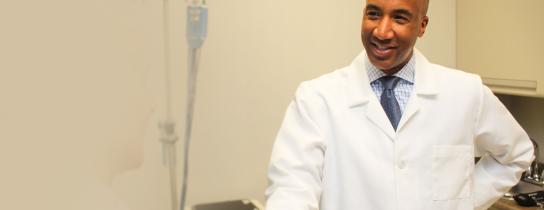
It’s More Common than You Think: Urologist Dr. Walker Gets Candid about Erectile Dysfunction, Part 2
Part 2
Currently there are many effective treatments for ED. First line in the armamentarium is the “pill" which brings me to the third misconception about ED – the idea that the “pill”- or phosphodiesterase inhibitor as it is referred to by medical professionals - including medications like Viagra and Cialis is dangerous and can have life threatening side effects. The truth is that with a couple of notable exceptions these medications are exceedingly safe and effective for most men. Exceptions include the use of these medications in men who are simultaneously taking nitrate containing medications, in whom dangerous decreases in blood pressure can occur when taken simultaneously with any of the oral medications for ED. Caution should also be exercised in men taking certain medications for urinary symptoms due to prostate enlargement (BPH) and in men with unstable heart disease in whom the increased stress of sexual activity can lead to cardiac arrest and other cardiac complications. A good rule of thumb is that these medications should only be taken after consulting with a physician and should bot be obtained over the counter or from other sources where a prescription is not required.
While oral therapies will be effective for most men presenting with ED, for men with more severe or chronic ED and those with other significant health problems like diabetes, the medications may not be effective. For these men consultation should be sought with an urologist to learn about other effective therapies including urethral suppositories, external vacuum devices that draw blood into the penis, and injections that men administer themselves to dilate the arteries of the penis and allow blood to flow in.
For more severe or resistant cases of ED, such as men who have had surgery for prostate cancer or men not eligible for or unhappy with pills and the second line treatments discussed above, inflatable penile implants can be surgically inserted and have been associated with very high satisfaction rates. In this surgery inflatable cylinders are inserted into the penis. The man activates a pump in the scrotum that moves fluid into the cylinders from a reservoir which is also internal when he wants to perform sexually. Afterwards a release mechanism deflates the device. The procedure is safe and extremely effective.
For younger men with psychogenic causes for their ED, short term use of pills can help restore confidence and may be all that is needed to get these men back on track. For those with true diagnoses of anxiety or depression, treatment by a psychiatrist can often help the problem. For others, consultation with a health psychologist for cognitive behavioral therapy can be very effective. For men with low testosterone, evaluation by an urologist or endocrinologist for testosterone replacement therapy is advised and in most cases will improve the condition.
While all of these therapies are effective for the treatment of men with ED at different stages of disease, ultimately they will become ineffective if the underlying causes of the disease are not addressed. This means that if men want to continue to respond to treatments they will have to improve their diets, lose weight, and exercise. The best diets for improving sexual function and reversing ED and ultimately heart disease are those that are plant-based or mostly plant-based, high in fiber, and low in saturated fats and dairy. Obviously avoidance of red meat, and sugary foods should be a top priority. Men with high cholesterol and diabetes will need to be vigilant with the help of their primary or family doctors about controlling their glucose and cholesterol levels. Men who smoke or consume more than a moderate amount of alcohol will need to discontinue these habits as well.
ED is a difficult but common condition that affects men of all ages. Although it is a treatable and even reversible condition, many men are reluctant to seek help placing themselves at risk for progression of the disease and the potential development of more serious conditions like heart disease. Urologists and other men’s health specialists are experts trained to face this challenging condition with men head on and who have the resources to help men navigate treatment and prevention of this disease. Help is only a phone call away!
Charles N. Walker, MD, earned his Medical Degree from Weill Medical College of Cornell University in New York, NY and completed his Residency in General Surgery, Urology at Yale New Haven Hospital. He is Board Certified in Urology and specializes in men’s health including Erectile Dysfunction (ED), Penile Implantation Surgery, Benign Prostatic Hyperplasia (BPH), treatment of low testosterone, Prostatitis, Peyronie’s Disease, and general Urology. Dr. Walker is seeing patients at Crystal Run’s Newburgh and Monroe location.

 Optum Radiology at Crystal Run Healthcare
Optum Radiology at Crystal Run Healthcare Request medical records online
Request medical records online